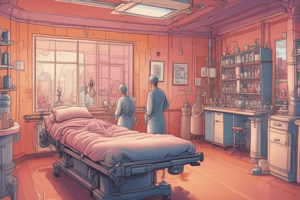Podcast
Questions and Answers
Which of the following folic acid antagonists is used in cancer treatment?
Which of the following folic acid antagonists is used in cancer treatment?
- Trimethoprim
- Phospholipid
- Sulfonamide
- Methotrexate (correct)
What is the end product of anaerobic catabolism of glucose in muscle tissue?
What is the end product of anaerobic catabolism of glucose in muscle tissue?
- Sucrose
- Carbon dioxide and water
- Lactate (correct)
- Ethanol
Which of the following lipids is amphipathic?
Which of the following lipids is amphipathic?
- Fatty acid
- Bile salts
- Phospholipids
- All of the above (correct)
What is the principal transport vehicle for cholesterol?
What is the principal transport vehicle for cholesterol?
Which of the following is the simplest hydrophilic moiety present in the membrane lipid?
Which of the following is the simplest hydrophilic moiety present in the membrane lipid?
What is the typical temperature range for slow freezing of fruits and vegetables?
What is the typical temperature range for slow freezing of fruits and vegetables?
Which of the following is NOT a type of amphipathic lipid?
Which of the following is NOT a type of amphipathic lipid?
What is the primary function of Low-density lipoproteins (LDL) in the body?
What is the primary function of Low-density lipoproteins (LDL) in the body?
What is the active compound responsible for the yellow color of turmeric?
What is the active compound responsible for the yellow color of turmeric?
Which of the following vitamins can cause dry skin when taken in excess?
Which of the following vitamins can cause dry skin when taken in excess?
What is the characteristic of skeletal muscles?
What is the characteristic of skeletal muscles?
Which process is not restricted to the mitochondria in eukaryotic cells?
Which process is not restricted to the mitochondria in eukaryotic cells?
Which hormone stimulates the secretion of gastric juice?
Which hormone stimulates the secretion of gastric juice?
Which of the following metals is used as a catalyst in the hydrogenation reaction?
Which of the following metals is used as a catalyst in the hydrogenation reaction?
Where does substrate-level phosphorylation occur in eukaryotic cells?
Where does substrate-level phosphorylation occur in eukaryotic cells?
What is the characteristic of striated muscle cells?
What is the characteristic of striated muscle cells?
Which enzyme is responsible for converting carbohydrates into maltose and glucose?
Which enzyme is responsible for converting carbohydrates into maltose and glucose?
What is the primary function of bile juice in fat digestion?
What is the primary function of bile juice in fat digestion?
Which enzyme catalyzes an irreversible reaction in glycolysis?
Which enzyme catalyzes an irreversible reaction in glycolysis?
Where do chylomicrons, carrying absorbed fats, first enter after digestion?
Where do chylomicrons, carrying absorbed fats, first enter after digestion?
What is the primary site of digestion and nutrient absorption in the human body?
What is the primary site of digestion and nutrient absorption in the human body?
What is the result of excess glucose in the blood in diabetes mellitus?
What is the result of excess glucose in the blood in diabetes mellitus?
How many types of cells are present in taste buds?
How many types of cells are present in taste buds?
Which of the following organs is responsible for producing bile juice?
Which of the following organs is responsible for producing bile juice?
Flashcards are hidden until you start studying
Study Notes
Folic Acid Antagonists
- Methotrexate is a folic acid antagonist commonly used in cancer treatment to inhibit DNA synthesis in rapidly dividing cells.
Anaerobic Catabolism of Glucose
- Under anaerobic conditions, glucose is converted to lactate in muscle tissue during glycolysis.
Amphipathic Lipids
- Amphipathic lipids contain both hydrophobic and hydrophilic regions, which include phospholipids, fatty acids, and bile salts.
Slow Freezing Process
- Slow freezing of fruits and vegetables typically occurs within a temperature range of -15°C to -21°C to maintain quality and extend shelf life.
Low-Density Lipoproteins (LDL)
- LDL is responsible for transporting cholesterol from the liver to peripheral tissues.
Hydrophilic Moiety
- The phosphate group is a hydrophilic part of membrane lipids like phospholipids, contributing to the amphipathic nature of these molecules.
Turmeric
- Curcumin is the active compound in turmeric that gives it its distinct yellow color.
Hydrogenation Reaction
- Nickel (Ni), Palladium (Pd), and Platinum (Pt) are all used as catalysts in hydrogenation reactions.
Vitamin A
- Excessive intake of Vitamin A can lead to dry skin among other symptoms of hypervitaminosis A.
Skeletal Muscle
- Skeletal muscles are striated and under voluntary control.
Eukaryotic Cells
- Substrate-level phosphorylation occurs in both the cytoplasm (during glycolysis) and the mitochondria (during the citric acid cycle).
Gastric Juice
- Gastrin is a hormone that stimulates the secretion of gastric acid by the stomach.
Diabetes Mellitus
- In diabetes mellitus, excess glucose in the blood spills into the urine (glucosuria), leading to increased urinary output (polyuria) and thirst (polydipsia).
Carbohydrate Digestion
- Amylase enzymes break down starches (carbohydrates) into maltose and glucose during digestion.
Taste Buds
- Taste buds contain three types of cells: gustatory cells (taste receptor cells), supporting cells, and basal cells.
Fat Digestion
- Bile juice, produced by the liver and stored in the gallbladder, emulsifies fats to aid in their digestion by pancreatic lipase.
Glycolysis
- Phosphofructokinase catalyzes an irreversible step in glycolysis, regulating the overall rate of glucose metabolism.
Fat Absorption
- Chylomicrons, carrying absorbed fats, first enter the lymphatic system (through lacteals) before eventually reaching the bloodstream.
Digestion
- The majority of digestion and nutrient absorption occurs in the small intestine, facilitated by enzymes from the pancreas and bile from the liver.
Studying That Suits You
Use AI to generate personalized quizzes and flashcards to suit your learning preferences.




